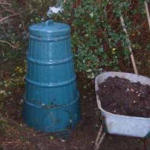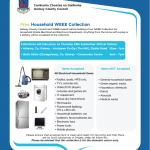We all know that excess waster generation is bad for the environment but as individuals what can we do to try and reduce the environmental impact of our daily activities? The best option is to try and prevent waste arising where possible.
Preventing waste before it’s ever created does have a positive impact – after all if you don’t create waste then you reduce the consumption of valuable resources such as water, oil and minerals.
What is waste prevention?
Prevention can be defined as any action that limits environmental damage. Preventing waste at source is the best option because if you don’t create it, then you don’t need to dispose of it! Simply, it’s stopping waste before it starts!
Most of us create waste unnecessarily – based on information available from the EPA, we discard approximately 30% of the food we buy – at least a portion of every two lettuces purchased is disposed of and other common food items disposed of regularly include pasta, rice, bread, fruit and vegetables.
How to prevent waste – small steps, big changes
Preventing waster can be difficult – it means looking at the way we live our lives and every choice we make – but with a little though and some small changes we can all make a positive difference. Our environment is depending on us!
Prevention means checking that you really need everything you use, and then using less if you can.
Waste prevention in the home
We each use items in the home that could be substituted with reusable options, for example using airtight containers instead of wrapping food stuff or lunches in tinfoil or cling film. Nationally we each use about 200kg of paper per year through newspapers, paper packaging etc. – the weight of a fully grown tiger! In making this paper, trees and thousands of litres of water are used.
So what can we do to help protect our environment?
- Think before you print and if necessary make sure to print on both sides of the page.
- Don’t pick up free newspapers that you won’t read – use internet sources for news.
- Use reusable containers.
- Be creative with leftovers.
- Buy quality products that can be upgraded to extend their useful life.
- Regular maintenance and repair extends your products life.
When Shopping
We throw out approximately 30% of the food we buy. All that extra food has to be brought home from the shops, cooked, refrigerated, plated out and washed up. Food related activities such as refrigeration, cooking and cleaning account for 71% of household use.
Top tips when shopping include:
- Plan to buy what you need and beware of special offers that go unused.
- Freeze food to prolong its life.
- Buy loose fruit and vegetables.
- Remember your reusable shopping bag.
- Buy less packaging – you’ll have to pay to get rid of it.
- Watch your food’s air miles – buy local as much as possible.
- Plan your menus to use in-season local produce.
Why prevent waste?
- Less waste going to landfill means fewer trucks on the road, fewer landfills and less energy used.
- Less waste means savings in CO2, and other greenhouse gases which cause climate change.
- Less waste means we can conserve valuable resources like trees, oil, metals and energy.
- If we use less, it should cost us less.
Green tips for presents
- Don’t forget wrapping paper goes into a bin, even if it is a recycling bin – use reusable gift bags instead.
- Consider vouchers for goods or services instead of presents.
- Don’t use gift cards – write directly on the present.
Home composting
Composting turns organic waste such as teabags, fruit, vegetable peelings and garden waste into a valuable product for the garden and can reduce the amount of household waste you send to landfill by up to 35%.
Many people consider doing some composting but do not attempt it because of fears such as vermin, smells or flies. By following some simple processes and precautions these problems can be overcome and composting can be a successful and enjoyable experience.
You can compost the following:
Green Waste
Fresh garden plant clippings
Teabags
Coffee grounds
Raw fruit and vegetable peelings
Garden waste
Brown Waste
Dead plant material
Spent compost or clay
Limited amounts of paper and cardboard
Sawdust
Egg boxes
You cannot compost metals or plastics, oils dairy products, treated sawdust, dog/cat litter or used tissues
What makes successful composting?
The first step is to get the mixture of waste balanced, and the second step is to mix the compost often. Choosing the right place for your compost bin is very important – choose a spot in your garden that is not too sunny and where the soil is free draining. This will ensure your compost will be moist but well aerated and will encourage insect activity and ultimately better compost. Located the compost bin or heap in a position that is convenient to your house – make using it easy for yourself.
Bring Banks
When using your local bring banks please ensure not to leave any boxes or bags behind. This is littering and excessive littering may result in fines or the Banks being removed. CCTV systems are operational at many of the Council’s Bring Bank sites and have helped enormously in reducing the amount of littering and illegal dumping taking place at these sites. When out and about, members of the public are encouraged to use public bins or take their waste home with them – it’s in all our interest to keep our country clean.
Green tips to keep in mind
- Think about how you can reduce your effect on the environment.
- Use your nearest Bring Banks and Recycling Centre regularly.
- Prevent as much waste as possible.
- Recycle as much of your waste as possible.
- Don’t burn waste.
- If you don’t do it already, get composting – up to 35% of household and most garden waste can be composted – it can only save you money!
- Conserve energy and water where possible.
For more information on waste prevention and waste management, contact the Environmental Section of Galway County Council on
091-476 402
or
[email protected]



